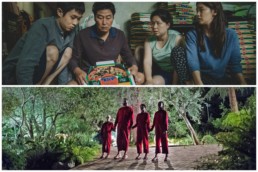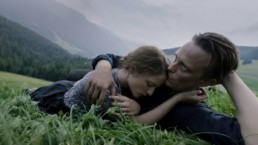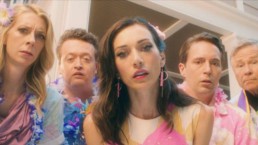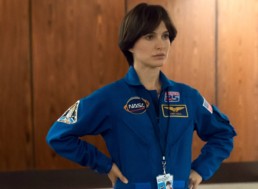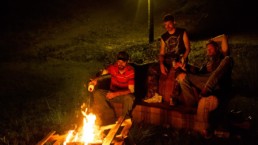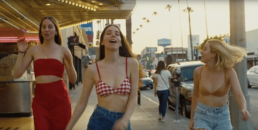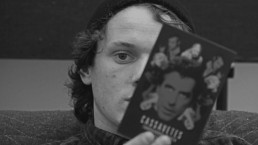In 2019, Which Films Felt Spiritually Connected?
There's no doubt that every film has its own singular and unique vision that is expressed by its filmmaker. However, it can be found that when films are released throughout the year, certain ideas can be seen between films that directors are all subconscious of circling. And when different films circle the same idea, those ideas become even more profound; It can reveal a universal truth that gets amplified.
In looking back on the films that I watched in 2019, I found several films that felt spiritually connected.
Modern Masters Contemplate the End of Their Eras in The Irishman & Once Upon a Time in... Hollywood
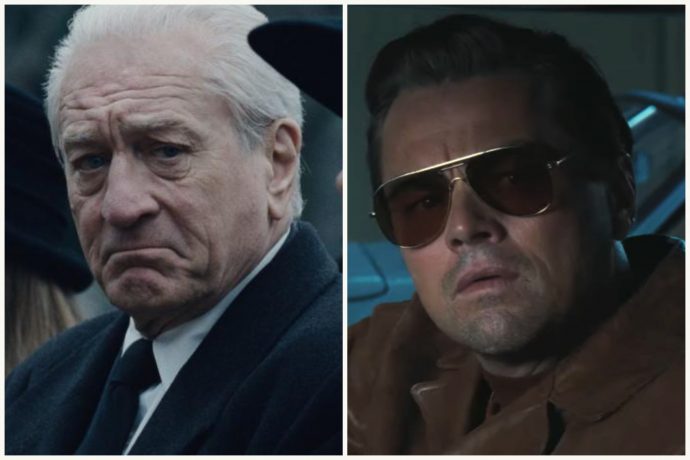
Despite what you may have heard, The Irishman isn't just another gangster movie. While Martin Scorsese's decades-spanning crime epic does follow the life of a hitman, the film is not another celebration of criminals like Goodfellas is. In The Irishman, Scorsese, now all of 77 years old, seems to be very much consciously reflecting on the end of his filmmaking career. To that end, he chooses to depict the story of Frank Sheeran (Robert DeNiro) through Sheeran recounting his life's end in an assisted living facility. Amidst the bloodshed and kills he's seen and done over his life, perhaps the heaviest blow that Scorsese deals to the audience is when Sheeran asks a nurse, maybe two generations his senior, if she knows who Jimmy Hoffa is – the same Hoffa (Al Pacino) that we see Sheeran dedicate his life to over three and a half hours in the film. After she admits to not knowing who the infamous union leader was, it feels as if Scorsese himself is confronting a larger existential question: if after a lifetime of achievements, if they go unrecognized – and especially by the ones you love, did it mean anything?
So too does Quentin Tarantino reflect on a similar sense of displacement in a shifting culture, as Once Upon a Time in… Hollywood shows former leading man Rick Dalton (Leonardo DiCaprio) struggling to admit that his best days are behind him and that he's eclipsed from relevancy. It's comical when he decries all of the "Goddamn hippies!" at every moment they pop up, revealing his anxiety to an uncertain future. Tarantino's and Scorsese's films both act as meta-tributes to the things they're known for doing best (Scorsese making a "gangster" film, Tarantino making a showy Hollywood romp). However, both directors imbue a piece of tragedy in their leading men's futile attempts to preserve a time that they know, or knew. It's heartbreaking that both Irishman and Hollywood end with each of their leading men – after having endured a lifetime of battles and achievements, and who should feel triumphant for it – being very much alone. After a lifetime of great accomplishments between Scorsese and Tarantino, these films feel as if even masters can feel a sense of emptiness and longing.
Rebirth At The End of Relationships, in Marriage Story & The Souvenir
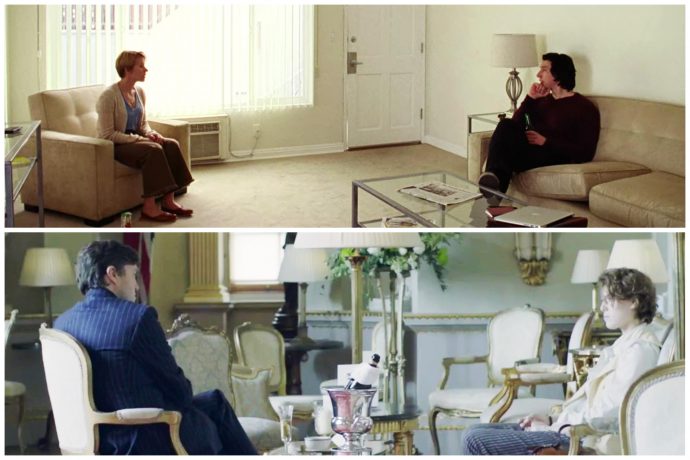
Two of my favorite films of last year were both beautifully made films about tumultuous relationships, and how the people in those relationships struggle to recover after bitter ends. In Marriage Story, writer-director Noah Baumbach shows that although two people can start out being so right for each other, sometimes they will grow apart. This is seen through the dissolving of marriage between theater director Charlie (Adam Driver) and his muse Nicole (Scarlett Johansson). While Marriage Story starts with Nicole's realization that she wants something different in her life, the film ends with Charlie (Driver) having to re-discover himself, and re-invent after heartbreak.
In another deeply personal film (also circling auto-biography), British director Joanna Hogg's The Souvenir tells the story of a demure young woman, Julie (Honor Swinton Byrne), whose relationship with Anthony (Tom Burke) is entirely co-dependent, even though his lifestyle is incredibly destructive and dangerous. While The Souvenir wasn't as big of a film as Marriage Story, it is one of the most rewarding movie-going experiences I had last year for its emotional vulnerability. While both films shows the emotional bottom that occurs when a life shatters, each film shows how we can pick ourselves back up, and sometimes that's exactly what we need to be re-born.
The Lighthouse & Joker Show There's Art in the Madness
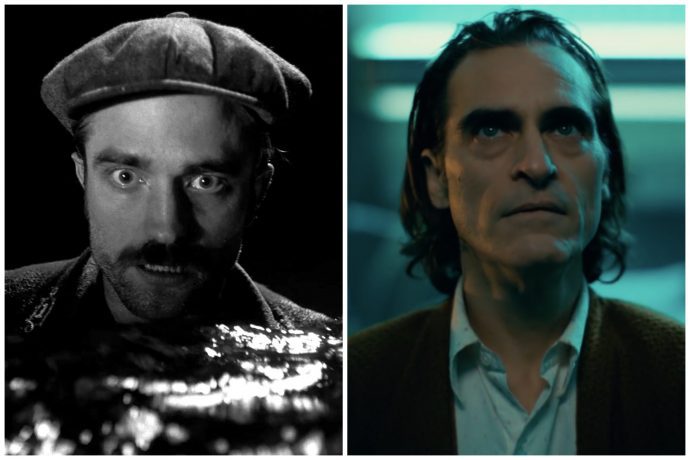
Blame it on the relentless stream of sensational news headlines or the current state of American politics, but 2019 felt like another strange and unsettling wobble in our nation's struggle to maintain shared national sanity. With the popularization of "fake news," it feels like people are growing more comfortable with living in their self-prescribed truths, which leaves the very concept of objectivity as something that no longer needs to be agreed on. Yes, there is a massive danger to that. Two films embodied this slip into madness perfectly: writer-director Robert Eggers, who directed 2015's The Witch, returned with The Lighthouse, a stormy black and white tale of two lighthouse workers who struggle to stay sane while isolated together. The film features two incredible performances, including Willem Dafoe as a craggy old veteran, but it's Robert Pattinson through which we see the actual unraveling of sanity. He begins the film convinced of his rightness, but after demented seagulls and dangerous mermaids appear, he loses his grasp on what's real and what's not.
And of course, what film embodied losing grip on reality better than Joaquin Phoenix, who took on the title role of playing a failed standup turned murderous terrorist in Joker. While Joker was met with concern for prophetizing a psyche of white male frustration (a very real issue in today's culture), all of these deranged performances – including Pattinson and Dafoe – should be applauded. They created such resonant characters that relieved some tension to a fractured male psyche, and yet were still inspiring in their artistry.
Social Commentary Disguised in Genre, in Parasite & Us
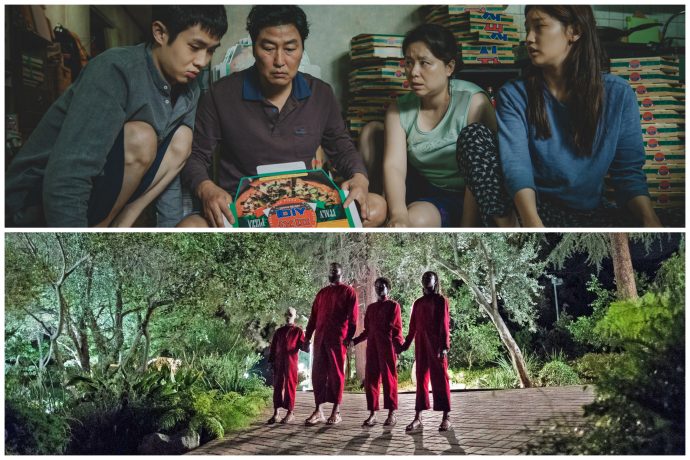
Sometimes, the more uncomfortably real a problem or issue is, the more that idea needs to be disguised through something more allegorical so that it can be better understood. It was so refreshing and revitalizing to see each of these next two films in theaters, as both audiences were electrified while watching. I saw Bong Joon Ho's Parasite after it had been around for a little while, and yet I didn't know anything about it going in (which is exactly how you should see it). Parasite starts as a whip-smart comedy about a low-income family that dupes a more affluent family into hiring each of them in their home, then becomes a head-spinning twisty horror that reveals another level to this concept. Ultimately, it becomes a politically charged piece (like all of Bong Joon Ho's films) that highlights the divide in the world through economic inequality.
Jordan Peele's follow up to Get Out, Us, uses a classic horror set up to show a film about a family and their doppelgängers who seek revenge in the world by taking their place all across America. Peele has proven that he's as aware of the meaning of every shot, and every piece of what goes into a film (much like this video essay shows) so that horror can be effective in informing people of real-world issues.
'A Hidden Life' Dares to Celebrate, Examine the Costs of One's Ethics
After exploring the experimental edges of narratively formless cinema with films like Song to Song and Knight of Cups, director Terrence Malick returns with his newest film: a meditation on morality that, both intimate and expansive, achieves wondrous results.
In this corporately competitive and politically combative era of 2019, it feels as if having personal ethics – compared to those untethered by having any self-imposed restrictions – is something of a weakness. If it's beliefs that hold you back from following wherever the ethically-compromised yardstick has been moved to, and if unethical practices then persist as a result, one must wonder: at what cost are those pesky little ethics truly worth?
It's a tragically philosophical question that has plagued countless men over time, and as a result, caused them to fall nameless to history over their actions (and inactions). It's also a meditation that director Terrence Malick beautifully ponders, celebrates, and examines in his wondrously magnificent new film, A Hidden Life, in theaters this Friday.
Those familiar with Malick will know what his films have in store: melancholic humans searching for life's answers in stories that range in vastness and ambition. At 2 hours and 53 minutes long, A Hidden Life ranks among his more ambitious works, and I'm happy to say that it's every bit as epic in its narrative and artistic scope.
What makes this meditation so transfixing is its setting and place in time: based on a true story of a German conscientious objector in WWII, A Hidden Life centers around the life of Franz Jägerstätter (August Diehl), a German villager and husband to Franziska (Valerie Pachner). It's a life that we see is full of infinite, simple beauties; they cut wheat in the most amazing golden fields, spin around vibrant green grass, and stare longingly into each other's eyes under the rich blue skies. Children soon form to show a happy family. But when the creeping subsiding of war slowly moves in like waves reaching higher tides, Franz is forced to assert an ethical stance that soon enough tears him apart from his family.
With a camera that gracefully glides through scenes, seeking and capturing spontaneous moments of Diehl and Pachner's quiet emoting and performing, Malick's distinguishable cinematography is on welcome display here. And assembled with its jump-cut editing, A Hidden Life feels like a film that's simultaneously unfurling in real-time as well as if remembered like a trace-memory, altogether an impressionistic tapestry of real feeling that cannot be imitated. Mixing this modernized look with its period-accurate era captures a timeless quality to the nature of ethics that gives it new life and resonance.
While Malick's latest experimental adventures (Song to Song, Knight of Cups) didn't tap into the cultural conversation for their understandably formless structures, A Hidden Life is bolstered by having a narrative center that organically moves the film forward, which is a welcomed element. Putting forward a meditation on such a universally important question as morality and inspiring people to ponder it is an ambitious, if not just plain admirable, task. The artistic achievement that is A Hidden Life is one that – like the devastatingly moving quote by George Eliot that the film ends with – should be seen and celebrated.
A HIDDEN LIFE (2019)
Starring August Diehl, Valerie Pachner, Matthias Schoenaerts
Directed by Terrence Malick
Written by Terrence Malick
Distributed by Fox Searchlight. 174 minutes.
Opening this Friday at ArcLight Hollywood and The Landmark.
https://www.youtube.com/watch?v=qJXmdY4lVR0
'Greener Grass' is Sitcom Humor Laced With Absurdity
For those who get their appetites filled by comedies of the ironic and insane variety, Greener Grass - the brainchild of Upright Citizen's Brigade comics Jocelyn DeBoer and Dawn Luebbe - is sure to satisfy. Greener Grass first premiered at this year's Sundance Film Festival and was picked up by IFC Midnight (the perfect distributor to serve up this comedy that's proudly self-spiked with gleefully bizarro corkscrews).
As its pastel blasted look would indicate, Greener Grass is like an 80s sitcom, if that sitcom was laced with trace amounts of psychedelics (think "Desperate Housewives" meets the demented stylings of "Tim and Eric"). With a never-ending stream of ever-increasing and more-ridiculous-than-the-last riffs, the comedy duo of DeBoer and Luebbe have found a rich space to both explore and explode. They tackle the hokey conventions and mannequin-normalcy of white, affluent middle-class suburbia.
Things kick off when Jill (DeBoer) gives up her baby to her best friend Lisa (Luebbe) in front of her un-athletic son at his youth soccer game. It sets the stage for what is possible in this world, a place where, at every moment, another social norm explodes. The most obvious example is that everyone wears braces, an injected awkwardness that their characters have no awareness. Things like this aren't a big deal for the women or their husbands, Dennis (Neil Casey) and Nick (Beck Bennett). The rest of Greener Grass has other absurd discoveries that the characters continue to find unsurprising. The murder of a yoga teacher, Nick's sudden taking to pool water, and getting pregnant with a soccer ball are just a few of the things the film has in store.
Greener Grass will likely be best enjoyed by those who seek comedy on the fringe and inflated past the limits of absurdity. A few of Greener Grass's performers are recognizable by self-professed comedy nerds: Bennett on SNL among them, as well as Janicza Bravo (who directed her own wild comedy, Lemon, starring husband Brett Gelman). Greener Grass and the comedic stylings of DeBoer and Luebbe create an amazing imagination space where – at just 95 minutes long – anything goes. And that's the most liberating part: you truly never know where it's going to go next. – Ryan Rojas
GREENER GRASS (2019)
Starring: Jocelyn DeBoer, Dawn Luebbe, Beck Bennett
Directed by: Jocelyn DeBoer, Dawn Luebbe
Written by: Jocelyn DeBoer, Dawn Luebbe
Distributor: IFC Films
Running time: 95 minutes
Playing: Opening 10/18 at the Nuart Theatre and On Demand
https://www.youtube.com/watch?v=iyOvQfgQhKQ
'The Lighthouse': Take This Drunken Plunge Into Madness
Among the most visionary and daring films of 2019, director Robert Eggers' sensationally absurd sailor's tale, The Lighthouse, should be recognized as one of the great achievements. Eggers – who's known by arthouse fans for writing and directing 2015's Puritan-possession film The Witch – returns with another nightmarishly hypnotic unraveling into madness.
Photographed in 4:3 black and white film by The Witch cinematographer Jarin Blaschke, The Lighthouse tells the story of two lighthouse keepers stationed on a remote and mysterious island in 1890s New England. Newly hired hand Winslow (Robert Pattinson) is eager to do an honest pay's work, at first uninterested in any small talk with his boss, Thomas (Willem Dafoe). But as the craggy old Thomas rants on (the period piece dialects that Pattinson, and especially Dafoe show is humorous and astonishing), hints of oddness creep in. Winslow soon finds that he's questioning Thomas's sanity altogether. But as the stormy season grows closer and stronger, and as stranger occurrences set in (including seagulls and tall tales of mermaids), Winslow tries to keep everything – including a checkered past – together.
The teaming of Eggers storytelling along with the dedication from Pattinson and Dafoe – giving the most fascinating and utterly incredible on-screen performances this year – The Lighthouse is some of the most demented fun you'll have in a theater this year.
THE LIGHTHOUSE (2019)
Starring: Willem Dafoe, Robert Pattinson
Directed by: Robert Eggers
Written by: Robert Eggers, Max Eggers
Distributor: A24
Running time: 109 minutes
Playing: Opening 10/18 at ArcLight Hollywood and The Landmark
'Lucy in the Sky' Muddles a Transcendent Moment
LUCY IN THE SKY (2019)
Starring Natalie Portman, Jon Hamm, Zazie Beetz
Directed by Noah Hawley
Written by Noah Hawley, Elliott DiGuiseppi, Brian C. Brown
Distributed by Fox Searchlight. 124 minutes. Opening 10/4 at Arclight Cinemas and The Landmark.
Lucy in the Sky tells the story of an astronaut, Lucy Cola (Natalie Portman) who, after viewing planet Earth from up above, has a moment of transcendence in which her world is changed (you see it in her captivated, hypnotized stare). The film then explores the way that a person's life may change when they've had such a moment, only to be brought back and expected to go about their previous existence. It's a valid thought experiment to ponder: would you feel empowered to embark on anything knowing you were in control, or would you unravel?
In this case, it's the latter. The mental unraveling of Lucy is an interesting angle for this or any film to have, nihilism taking over. But the film doesn't quite communicate this in the cleanest way. Natalie Portman as Lucy Cola, a fiery, whip-smart Texan astronaut could have had more interesting or entertaining ways of living her life again, but instead she acts on confusingly base impulses like beginning an affair with a colleague (Jon Hamm), and ending up driving across state lines in a koo koo disguise to warn the woman he's now seeing (Zazie Beetz) of his untrustworthy ways. It's a storyline that, while apparently based on real events (the film is based on the true story), sacrifices an opportunity to sift through more poignant philosophical thoughts, and instead makes for an odd reading of feminism.
The overall visual language of Lucy in the Sky is also confusing – I'm curious why director Noah Hawley changed aspect ratio so much, as it makes for a distracting experience. But there's still an interesting thought that, once you acknowledge your unfathomably small place in the universe, what will you do next?
https://www.youtube.com/watch?v=vQP-L2pJzmk&t=3s
Horsing Around in the Quirky Comedy 'The Death of Dick Long'
THE DEATH OF DICK LONG (2019)
Starring Michael Abbott Jr., Virginia Newcomb, Andre Hyland
Directed by Daniel Scheinert
Written by Billy Chew
Distributed by A24. 100 minutes. Opening 9/27 at Arclight Hollywood and Alamo Drafthouse Cinema - Downtown LA.
The Death of Dick Long may have a fairly sophomoric joke right in its title. And yes, it might be set in a rural small-town Alabama community. And, well, there might be a solid amount of "butt rock" that soundtracks the entirety of the movie (yes, '90s bands including Nickelback are prominently featured). But much like how director Daniel Scheinert used the easily laughable power of a farting corpse to win over audiences in Swiss Army Man (the film he co-directed with Daniel Kwan as part of the creative team DANIELS, but here making his solo directorial debut), it's all there to disarm the audience into thinking that there isn't a higher, more incredibly skilled and smarter operating power controlling the whole charade; there certainly is.
It's not a spoiler for the audience to know that Dick Long (Daniel Scheinert), who ends band practice with redneck pals Zeke (Michael Abbott Jr.) and Earl (Andre Hyland) by sparking a joint before fatefully asking: "Y'all motherfuckers wanna get weird?," dies; it's right there in the title. But after a booze-fueled night in which Dick ends up mysteriously dead, his frightened friends are left to cover it up as best as their nincompoop selves can. All the while, Zeke's family – his wife Lydia (Virginia Newcomb) and daughter (Poppy Cunningham) – and local law enforcement (Janelle Cochrane and Sarah Baker) come ever closer to putting together the strange and coincidental pieces of this deadly disappearance.
This is essentially the main gag of the film: seeing Zeke and the never-not-vaping Earl, attempt to stay one step ahead of everyone before the whole thing is exposed. But these guys are not the sharpest tools in the shed, leading to comedic moments such as asking each other how the bloody backseat of a car was cleaned out in Pulp Fiction. The mix of jokes and real tension is expertly compiled, all leading up to the climactic reveal of what happened to Dick that fateful night (without over-hyping it and certainly without spoiling it, it's one of the most unbelievably amazing twists of any recent comedy). More surprising than this screwy reveal is the emotional impact that it brings, and this is when you realize the power of screenwriter Billy Chew's script, which successfully weaves together a hilarious premise, sharp story, and emotional honesty to engage the audience on all levels.
The fact that all of these differing and strange elements come together is ultimately attributed to the quirky mind of Daniel Scheinert, whose brand of silly-meets-sincere joke-making has come to be known (or should definitely come to be known) as a new and deserving style in comedy. While the whole event is a sort of screwball affair, Scheinert doesn't rely on the same shallow riff of redneck clichés, but lends his own insight as an Alabama native to celebrate Southern culture while still having fun with it (to me, Logan Lucky, did the same). Once the climactic reveal happens, it's a hilariously side-splitting moment, but you would be pressed to not feel an equal wave of somber sympathy at the same time. The Death of Dick Long is a wealth of wit, smarts, and unexpected heart. It's already the funniest film of this year and I can't wait to see it again.
This review originally ran on February 6, 2019, during the Sundance Film Festival.
#Hotgirlsummer: Thoughts on Paul Thomas Anderson's latest music video, 'Summer Girl'
There's a trend that's rippling through social media (and IRL) that I'm only vaguely aware of since writing this post: "hot girl summer." My immediate friend group isn't able to explain this phenomenon to me easily, and I've chosen to forego an online search, so I'm going to go ahead and extract the following: things with expiration dates give people a sense of peace. In this case, "hot girl summer" sounds like a fad in which people are allowed to act out or play up a more idealized version of ourselves. We're given the permission to "feel thyself," but we know it's only for this summer season. We'll make up for our sins in the autumn.
A rock band that doesn't indulge in commercially-supported movements of any kind, indie rockers and sisters-trio, HAIM, have coincidentally released a new single during this "hot girl summer," called "Summer Girl." Lead singer Danielle Haim stated in an Instagram post that lyrically, "Summer Girl" started as something she would say to her (then) cancer-stricken boyfriend to attempt to soothe him ("Let me be your summer girl"). Musically, it started as a loop in Garage Band, not-unknowingly echoing Lou Reed's "Walk on the Wild Side."
And now, we have a music video to accompany the single directed by recent frequent collaborator Paul Thomas Anderson. He captures the girls strutting down the sunny streets of LA (including trips through Canter's Deli and the New Beverly Cinema). As the sisters walk shoulder-to-shoulder, they strip away infinite layers of tops – thrift store sweaters only reveal more thrift store t-shirts underneath – a never-ending shedding of skin. It's important to note that they're also outpacing a meandering saxophone-tooting dude, who they ask in the song to "Walk beside me, not behind me." At the end of the video, they finally get down to the last article of clothing, strutting even more assertively than at any other point. This moment must be the hot girl summer I've heard of.
So, ok. HAIM asked the mopey saxophonist to walk beside them, to join these hot girls of summer. I'll attempt to do the same. I click on an article titled Hot Girl Summer, Explained. One line from the article explains the movement is "Just as much about posting hot photos as it is living your life with confidence." So, ok; confidence. That sounds positively empowering, and even more asexual then I previously assumed. So, did I initially give an unfair reading of what I thought "hot girl summer" was? Was I also following from behind, tooting a sad saxophone without fully understanding this of-the-moment, women-borne movement, instead of walking beside them? Buddha said that, just as a snake sheds its skin, we must shed our past over and over again. It's time for all of us – every one of us, a hot girl of the summer – to strip off the layers that hold us back, and to do so every season, without expiration, infinitely.
The Bright Light of Anton Yelchin Remembered in 'Love, Antosha'
Love, Antosha had its world premiere at the Sundance film festival, where the late actor's friends and parents shared this film with a welcoming and humbled audience. The documentary, produced by Like Crazy director Drake Doremus and directed by first-time filmmaker Garret Price, proved more than a simple biography. The film is a detailed and loving look at an artist whose curiosity and compassion for art and life was so pure. Here's what you need to know about the film.
The documentary, Love, Antosha, captures the life of the intellectual, spirited, and beloved artist, Anton Yelchin. Directed by Garett Price and produced by Drake Doremus, the film captures Yelchin’s life story and acclaimed film career that ended at the age of 27 after a freak auto-accident in 2016. Using home video footage, self-shot videos, interviews with friends and Hollywood talent alike – as well as his personal diaries – we are given a comprehensive look inside the mind of an artist who was creatively unbound and yet still internally conflicted.
Antony Yelchin appeared onscreen for most of his life, in a total of 69 film and television projects (most widely known as Chekov in J.J. Abrams’ Star Trek reboot). The film celebrates the creativity that Yelchin permeated throughout his life, where stars like Kristen Stewart, Chris Pine, John Cho, and Jennifer Lawrence offer remembrances through on-camera interviews. Whether it was devouring classic films, playing music in his band (The Hammerheads), or furthering his passion for photography, Yelchin was always learning, growing, and searching. But it’s this same anxious artistic drive to pursue his passions that also reveals his restlessness in other areas of his life. The film does not shy away from showing an artist conflicted and often occupied with complexities.
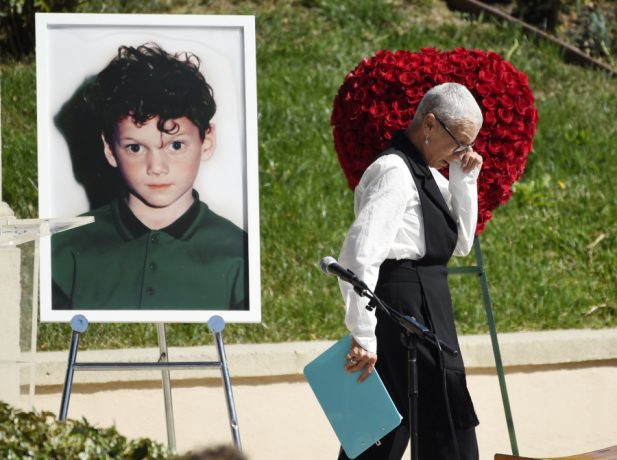
Love, Antosha reveals that Anton secretly battled the auto-immune disease cystic fibrosis (which was never publicly acknowledged), and bouts of breathing and coughing issues. A curious and self-aware person, the documentary portrays one heartbreaking moment when Yelchin researches the average age of life expectancy for people with his disease. The results show less than forty years old. The question may arise as to whether or not, on some intuitive level, the self-aware Anton knew that his life would be short-lived? And if this drove him to subconsciously consume as much art and experiences as he could in his young life.
Beyond his creative and artistic drives, one of the most genuine parts of the documentary is the relationship between his parents, Viktor and Irina Yelchin. Former Russian figure skaters fleeing Jewish persecution in Ukraine, the Yelchins immigrated to the US where they raised their only child, Anton aka Antosha. Whether it was hugging, dancing, or showering her with his affection, Love, Antosha demonstrates his purity of heart by the many handwritten notes that he gave her, all signed “Love, Antosha.”
Love, Antosha is a beautiful dedication of a great artist and missed human being who inspired so many. There’s no shortage of loving things that people have to say about him, remembering how much of an old soul and wise beyond his years he was. But the film also succeeds by not shying away from the other truths of his life. In revealing the insecurities and fears that drove him, it paints an honest picture of a young man’s journey to understand life. It’s in continuing to be curious and compassionate that, beyond just watching his films, Anton will always live on through us all.
LOVE, ANTOSHA (2019)
Starring Anton Yelchin
Directed by Garret Price
93 minutes. Opens this Friday at the Nuart Theatre.
This review originally ran on February 1, 2019, during the Sundance Film Festival
https://www.youtube.com/watch?v=hzrFqZcosI0

